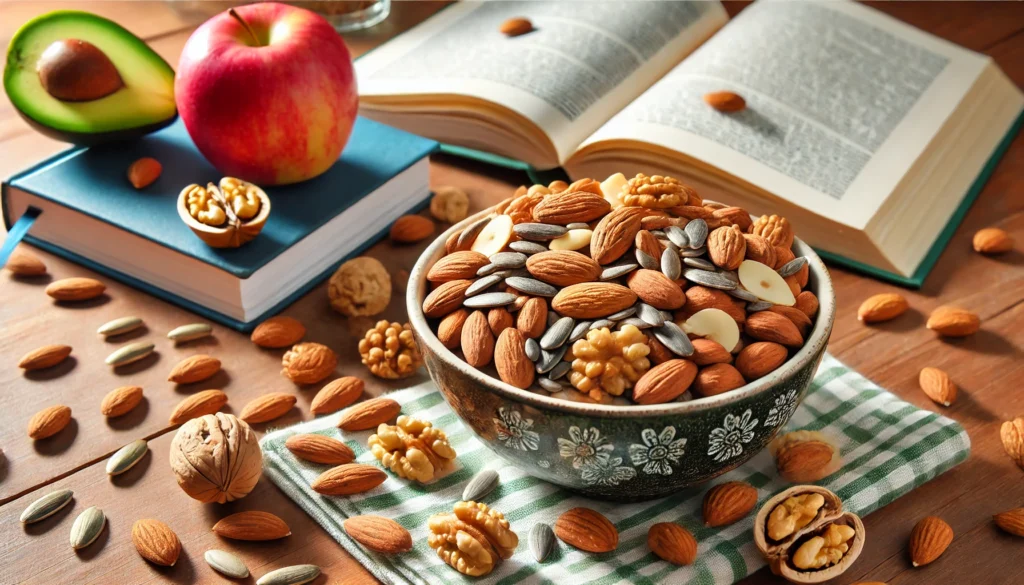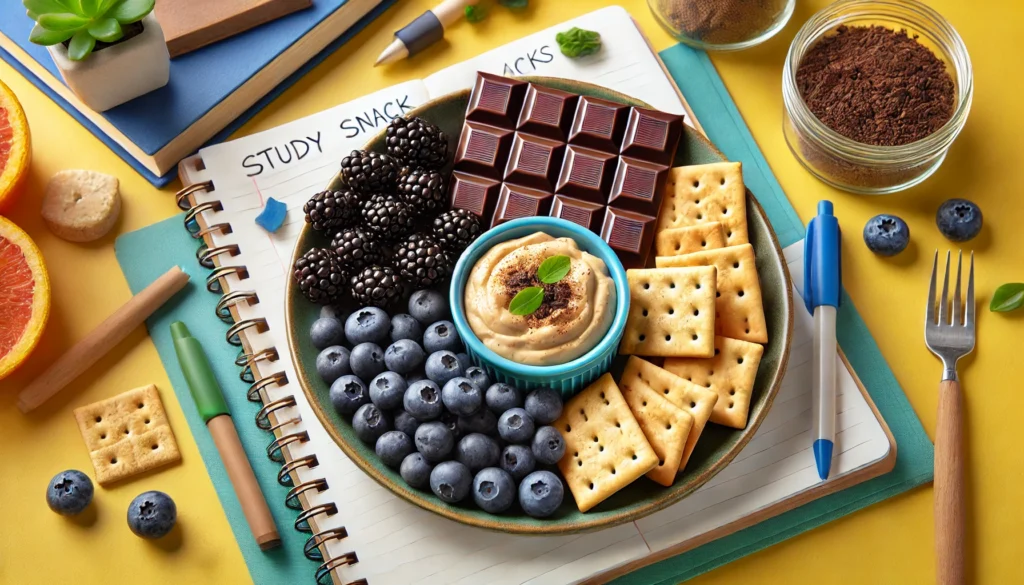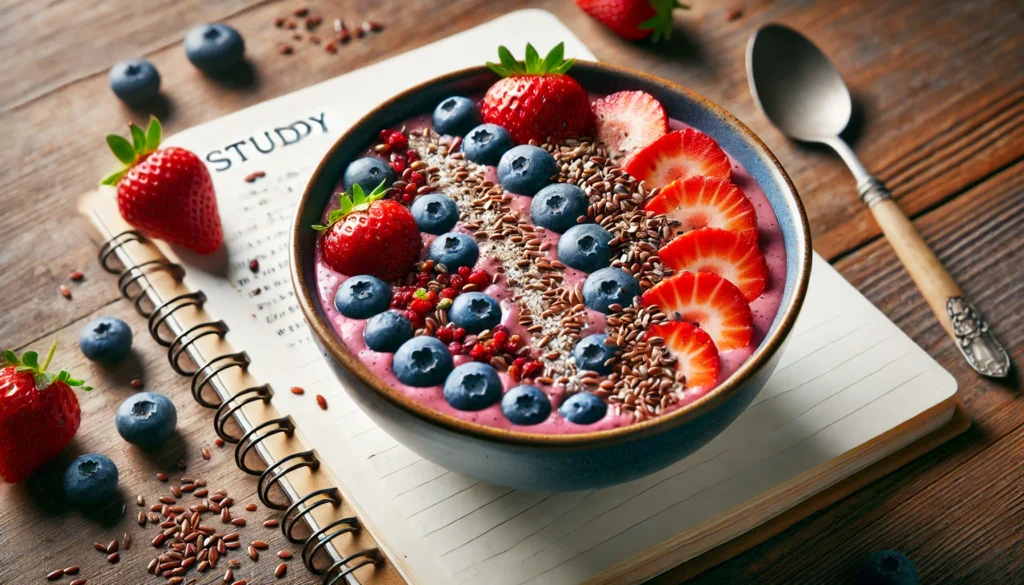Understanding the intricate relationship between diet and brain function is crucial.
The Energy Needs of the Brain
The brain is a high-energy organ, consuming about 20% of the body’s calories. This constant demand for energy highlights the importance of a steady supply of glucose, primarily obtained from carbohydrates. The type of carbohydrate consumed plays a significant role. Simple sugars can cause spikes and crashes in energy levels, whereas complex carbohydrates, like those found in whole grains and vegetables, provide a slow and steady release of glucose, maintaining consistent energy levels for optimal brain performance.
You may also like: Best Foods for Sharp Mental Focus
The Role of Omega-3 Fatty Acids
Omega-3 fatty acids are essential for maintaining brain structure and function. They are crucial components of cell membranes in the brain and influence the fluidity and communication between brain cells. Sources such as fish, flaxseeds, and walnuts are rich in omega-3s. These fats are not only vital for cognitive development but also for reducing inflammation and promoting mental well-being.
Antioxidants and Brain Protection
Antioxidants, found abundantly in fruits and vegetables, play a pivotal role in protecting brain cells from oxidative stress. This stress results from free radicals, which can damage cells and lead to cognitive decline over time. Vitamins C and E, as well as flavonoids, act as antioxidants and are essential for maintaining brain health. By neutralizing free radicals, antioxidants help preserve memory and cognitive functions.
The Importance of Vitamins and Minerals
Vitamins like B6, B12, and folate are indispensable for brain metabolism and the production of neurotransmitters, which facilitate communication between neurons. Adequate levels of these vitamins support mood regulation and cognitive performance. Minerals such as iron, zinc, and magnesium are equally critical, as they contribute to oxygen transport, neurotransmitter function, and stress reduction, respectively.

Snacks That Enhance Study Focus
Choosing the right snacks can significantly impact your study sessions.
Nuts and Seeds
Nuts and seeds are a powerhouse of nutrients beneficial for brain health.
The Nutritional Profile of Nuts and Seeds
These small but mighty snacks are rich in healthy fats, protein, and antioxidants. Each type of nut and seed offers unique benefits. Walnuts, for example, are renowned for their high content of DHA, a type of omega-3 fatty acid vital for brain function. Almonds and sunflower seeds provide vitamin E, an antioxidant crucial for protecting brain cells from oxidative damage.
Creative Ways to Incorporate Nuts and Seeds
Incorporating nuts and seeds into your diet can be deliciously simple. Sprinkle a handful of mixed nuts into your yogurt or oatmeal for an added crunch. Create a custom trail mix with nuts, seeds, and dried fruits for a portable, nutrient-dense snack. For a savory option, consider roasting nuts with your favorite spices.
The Long-term Benefits of Consuming Nuts and Seeds
Regular consumption of nuts and seeds not only boosts immediate cognitive performance but also supports long-term brain health. These snacks can help reduce the risk of neurodegenerative diseases and improve overall mental acuity. Their nutrient density makes them an ideal choice for sustained energy and focus during study sessions.
Berries
Berries, especially blueberries, are packed with antioxidants and phytochemicals that support brain health.
The Brain-Boosting Compounds in Berries
Berries contain flavonoids, which are known to improve memory and cognitive function. These compounds increase blood flow to the brain, promoting better communication between brain cells. Regular consumption of berries has been linked to delayed cognitive decline and improved mental performance.
Easy Ways to Add Berries to Your Diet
Adding berries to your diet can be both simple and enjoyable. Toss a handful of berries into your morning smoothie or cereal for a burst of flavor and nutrients. Enjoy them as a fresh, sweet snack on their own, or incorporate them into baked goods for a nutritious treat.
The Versatility and Benefits of Berries
Berries are not only delicious but also versatile. They can be used in a variety of dishes, from salads to desserts, making them an easy addition to any meal plan. Their low calorie and high fiber content make them an ideal snack for maintaining energy levels and supporting digestive health.
Dark Chocolate
Yes, you read that right—chocolate can be a good study snack!
The Cognitive Benefits of Dark Chocolate
Dark chocolate is rich in flavonoids, caffeine, and antioxidants, all of which can enhance brain function. Flavonoids improve blood flow to the brain, enhancing focus and concentration. Caffeine provides a temporary boost in alertness and mental clarity, making dark chocolate an ideal treat for a quick pick-me-up.
Mindful Consumption of Dark Chocolate
While dark chocolate can be beneficial, moderation is key due to its sugar and calorie content. Enjoy a small square of dark chocolate as a treat, savoring its rich flavor. Pair it with other brain-boosting foods, like nuts and seeds, for a balanced snack that supports cognitive function.
Exploring Different Ways to Enjoy Dark Chocolate
Dark chocolate can be enjoyed in various forms. Mix dark chocolate chips with nuts and seeds for a balanced snack, or melt it to drizzle over fruit for a decadent yet healthy dessert. Its versatility makes it a delightful addition to any study snack repertoire.
Avocados
Avocados are full of healthy monounsaturated fats, which contribute to healthy blood flow and lower blood pressure.
The Nutritional Benefits of Avocados
Rich in healthy fats, avocados support healthy blood flow, essential for maintaining cognitive function. They provide vitamin K and folate, nutrients that improve brain health and cognitive function. Avocados also offer a creamy texture and mild flavor, making them a versatile ingredient in many dishes.
Delicious Ways to Incorporate Avocados
Incorporating avocados into your diet can be both simple and satisfying. Spread avocado on whole-grain toast for a hearty and nutritious snack. Add sliced avocado to salads or wraps for an extra dose of healthy fats and a delicious creaminess.
The Long-term Impact of Avocado Consumption
Regular consumption of avocados can have long-term benefits for brain health. They may help reduce the risk of cognitive decline and improve overall mental performance. Their nutrient profile makes them a valuable addition to any diet focused on supporting brain function.
Whole Grains
Whole grains like oats, barley, and quinoa provide the brain with a steady supply of glucose.
The Benefits of Whole Grains for Brain Health
Whole grains are a crucial component of a brain-healthy diet. Unlike refined grains, they have a low glycemic index, meaning they release energy slowly and help maintain concentration and focus. They are rich in fiber, vitamins, and minerals, all of which support cognitive function and overall well-being.
Creative Ways to Enjoy Whole Grains
Incorporating whole grains into your meals can be both delicious and nutritious. Prepare a bowl of oatmeal topped with nuts and berries for a satisfying breakfast. Snack on whole-grain crackers with hummus or cheese for a balanced and energizing snack. Experiment with quinoa salads or barley soups for a hearty and wholesome meal.
The Role of Whole Grains in Long-term Cognitive Health
Regular consumption of whole grains can support long-term brain health. They help maintain stable blood sugar levels, reducing the risk of cognitive decline and improving mental clarity. Their nutrient density makes them an essential part of a balanced diet focused on enhancing cognitive performance.

The Role of Hydration
It’s not just food that affects brain function—hydration plays a key role too.
The Importance of Staying Hydrated
Hydration is crucial for maintaining cognitive function and overall well-being. Dehydration can lead to fatigue, headaches, and reduced concentration, all of which can hinder study efforts. Drinking plenty of water throughout the day is essential for keeping the brain functioning optimally.
Creative Ways to Stay Hydrated
Staying hydrated can be both simple and enjoyable. Herbal teas and infused water offer variety and additional nutrients, making them a flavorful alternative to plain water. Adding slices of fruit or herbs to water can enhance its taste and encourage regular consumption.
The Long-term Benefits of Proper Hydration
Consistent hydration supports brain health and can improve cognitive performance over time. It helps maintain energy levels, supports memory function, and reduces the risk of cognitive decline. Incorporating hydration into your daily routine can lead to lasting benefits for both mental and physical health.
Historical Context and Current Trends
Throughout history, various cultures have recognized the importance of food in cognitive function.
Ancient Practices and Beliefs
The ancient Greeks, for instance, consumed walnuts believing they improved brain performance. Similarly, many traditional diets have emphasized foods that support mental clarity and cognitive health, recognizing the intrinsic link between diet and brain function.
The Rise of Biohacking
Today, there’s a growing trend towards biohacking—a practice aimed at enhancing physical and mental performance through diet, supplements, and technology. This trend underscores the increasing awareness of nutrition’s role in mental acuity and the pursuit of optimal cognitive function.
Modern Nutritional Research and Its Implications
Modern research continues to explore the intricate relationship between diet and brain health. This growing body of evidence supports the idea that specific foods and nutrients can significantly impact cognitive performance. As a result, there is a heightened interest in personalized nutrition and its potential to revolutionize how we approach brain health.

Future Implications
As scientific research continues to unveil the intricate relationship between diet and brain health, the future holds promising implications for cognitive enhancement.
The Potential of Personalized Nutrition
Personalized nutrition, where diets are tailored to an individual’s genetic makeup, is on the horizon. This approach could revolutionize how we use food to boost brain power and improve study focus. By understanding individual nutritional needs, we can optimize cognitive function and overall health.
The Role of Technology in Nutritional Advancements
Technology plays a pivotal role in advancing our understanding of nutrition and brain health. From genetic testing to wearable devices that track dietary intake, technology is paving the way for more precise and effective nutritional interventions.
The Evolving Landscape of Brain Health Research
As research continues to evolve, we can expect new insights into the complex relationship between diet and cognitive function. This evolving landscape holds the potential to transform our approach to brain health, offering new strategies for enhancing mental performance and overall well-being.
Conclusion
In conclusion, the right snacks can significantly impact study focus and cognitive performance. By choosing nutrient-dense options like nuts, berries, dark chocolate, avocados, and whole grains, students can provide their brains with the necessary fuel to excel academically. As the understanding of nutrition and brain health evolves, embracing these healthy eating habits can lead to lasting benefits for mental performance and overall well-being. Remember, the next time you’re reaching for a snack while studying, make it one that nourishes your mind as well as your body.
Further Reading:
5 Healthy Study Snacks to Help You Focus
Healthy Study Snacks for College Students
Important Note: The information contained in this article is for general informational purposes only, and should not be construed as health or medical advice, nor is it intended to diagnose, prevent, treat, or cure any disease or health condition. Before embarking on any diet, fitness regimen, or program of nutritional supplementation, it is advisable to consult your healthcare professional in order to determine its safety and probable efficacy in terms of your individual state of health.
Regarding Nutritional Supplements Or Other Non-Prescription Health Products: If any nutritional supplements or other non-prescription health products are mentioned in the foregoing article, any claims or statements made about them have not been evaluated by the U.S. Food and Drug Administration, and such nutritional supplements or other health products are not intended to diagnose, treat, cure, or prevent any disease.


